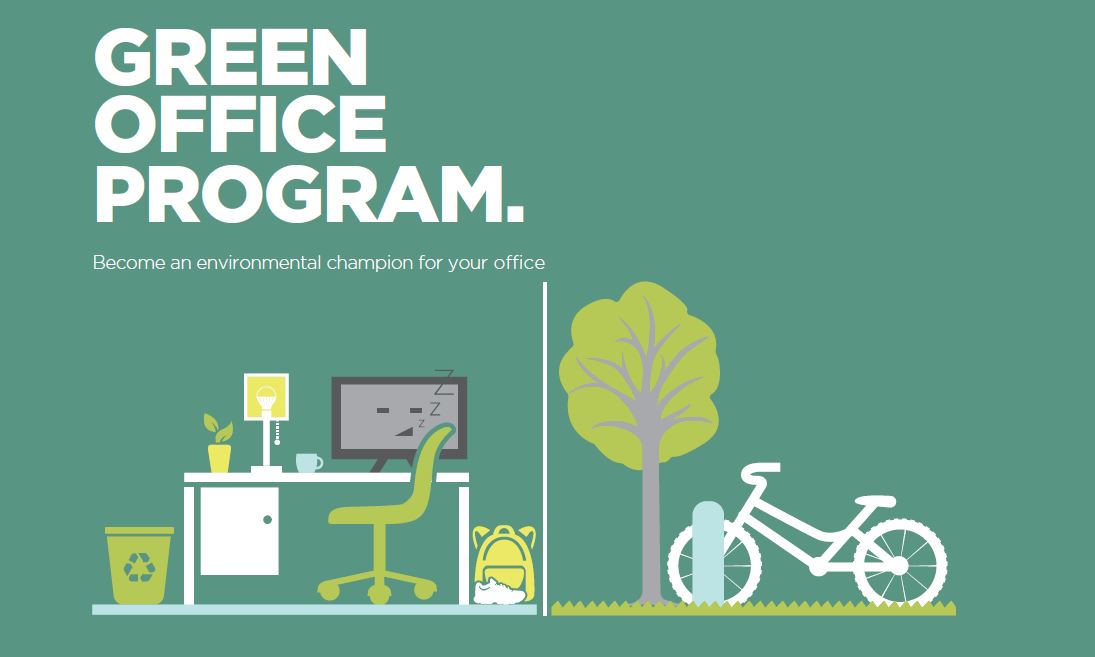
The Green Office Program engages faculty and staff in a fun certification program aimed to help offices contribute to the university’s goals of achieving carbon neutrality by 2061 and 50% waste diversion by 2030.
The program supports offices in their efforts to Make Orange Green through educational materials, financial resources, and an easy-to-use structure for goal setting and making progress.
How does the program work?
Each office must:
- Select a “Green Office Rep” who will be responsible for completing the Self-Assessment Checklist and act as the liaison between the office and the Office of Sustainability.
- Download the Self-Assessment Checklist PDF (do not edit in your web browser!) and complete the form according to your office’s daily operations.
- Save your checklist as “Your Office_Month Year_Green Office Checklist” and send it to sustainability@utk.edu.
- Ex: “Office of Sustainability_January 2020_Green Office Checklist”
- The Green Office Coordinator will review your checklist and reach back out to schedule an in-person visit with your office.
- Create a plan to improve your score. This can be done with the help of the Green Office Coordinator during the in-person visit or on your own.
- After you’ve made your plan and had your in-person visit, you can choose to re-submit your self-assessment with any adjustments or stick with your original submission to receive your official certification.
- Celebrate becoming a Green Office!
- Re-certify a minimum of once every 2 years (or more frequently if you would like to try moving up a certification level).
Certification Levels:
- 10 Checks: Green Office Certified
- 15 Checks: Bronze
- 20 Checks: Silver
- 25 Checks: Gold
- 28+ Checks: Platinum
Frequently Asked Questions
The Green Office Program was re-launched in 2020 as part of the new Office of Sustainability to reflect programs inherited through merging offices with UT Recycling in 2019. The program is designed to help individual offices contribute to the University of Tennessee’s goals of achieving carbon neutrality by 2061 and increasing the campus waste diversion rate from 33% to 50% by 2030.
Many small actions really do add up to big change.
To provide an example, if one computer is left on for a day, it results in:
8 kWh of electricity, which requires 2.2 lbs of coal of to be consumed, which would then result in 6.292 lbs of CO2 to be released into the atmosphere…
That means that after a year, that computer will have consumed 1,051 kWh of electricity, which translates to 803 lbs of coal. That’s equivalent to emitting 2,296.6 lbs of CO2 into the atmosphere. Just by turning off one computer when it’s not in use, your office can have a big impact!
Your office is however you wish to define it! It should, however, include shared common areas and resources. It may be a 5 person team or an entire 50 person department. Offices of all sizes are welcome and encouraged to participate.
Yes! We understand that some criteria do require a monetary investment to complete successfully. A portion of the Student Green Fee has been allocated to assist offices with the full cost of upgrades that will directly reduce their resource consumption.These funds can be requested through participation in the Green Office Program.
Use of funds can include, but are not limited to:
- Energy efficient models of existing appliances and electronics
- Smart power strips
- Motion light sensors
- Anything else that will help your office become more sustainable
Looking to make a larger purchase, such as an electric vehicle/golf cart or a piece of equipment powered by alternative fuels? Apply for funding through the Alternative Fuel Vehicle Assistance Program.
Absolutely! We can present on most any sustainability-related topic, and if at least half of your office attends, you’ll earn an Innovation point. Submit this form to schedule a time.
While we hope to offer compost pick-up in every office that participates in the future, our current infrastructure only allows participation in certain locations. If you are interested in beginning compost collection in your office to gain an “Innovation” point, ask your Green Office Coordinator to discuss options with you.